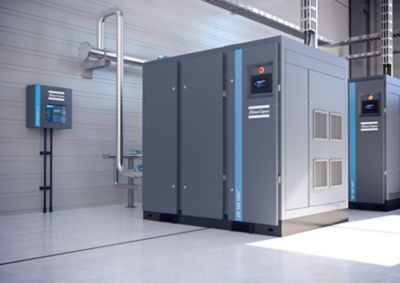Reading time: 3 minutes, 30 seconds
Salutas switch to new compressed air concept increases operational safety and efficiency
Generic manufacturer Salutas has completely refurbished the compressed air supply at its Barleben plant. Security of supply increased and energy efficiency improved. Qualitatively, the compressed air produced meets the strict standards of the pharmaceutical industry and even meets the high standards of the US market.
One could use a lot of superlatives to suit the size, versatility and productivity of the production plant but it's best to let the numbers speak for themselves. In a production area of 17300 m², 24 tablet presses, 17 granulators and 10 coaters are in use around the clock. 300 active pharmaceutical ingredients are processed into approximately 15500 different finished products, packed on 24 lines and shipped to more than 75 countries. 1200 delivery notes are processed daily for the domestic market, 7000 articles per week delivered.
High air quality standards and reliable continuous air supply
Oil free air compressors and heat of compression dryers for maximum efficiency
The two air compressor stations, which were completely renewed in the fall of 2015 and fed into a common grid, can be safely used to meet the mentioned requirements. The first station is equipped with four of water cooled ZR (ZR 160 VSD, ZR 160 and ZR 200) oil-free screw compressors. Here three heat-generating desiccant dryers of the model XD 850+ G ZP (the G stands for guaranteed pressure dew point) along with three sets of filters (a particles-, activated carbon- and micro-filter) produce the required air quality. The XD dryer was specially developed as an energy-saving drying component for oil free air ZR compressors. The two compressors in the smaller second station are oil-free screw ZT ( ZT 160 VSD and ZT 145 combined with two heat-regenerating adsorption dryers BD 850+ ZP with heater and external blower, as well as two sets of compressed air filters. Every station has a mix of speed regulated and fixed speed air compressors. For each station one compressor and one dryer are kept redundant. In addition, both stations complement each other in the event of a fault.
The global specifications from the Novartis Group, which also concern compressed air, recommends the heat-of-compression process as a good, efficient way to regenerate the desiccant. We can save about 180 kilowatts of compressor power compared to earlier.
Investing in the future
After the step-by-step renovation of both stations was realized during production with the help of a large rental compressor, Christian Dörge can see today that his requirements for compressed air are thoroughly fulfilled. On the one hand, the project engineer expects considerable energy savings. Naturally, these will also be documented in the energy management system according to ISO 50001 standards, which Salutas intends to implement later this year. On the other hand, Dörge finds the site to be well positioned for years to come: "We have not only invested in the supply of compressed air, but also in the quality of the future; because the air standards in the pharmaceutical industry will be higher rather than lower over time", predicts Christian.

